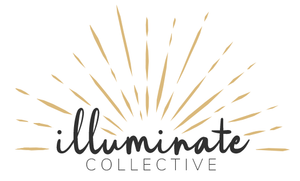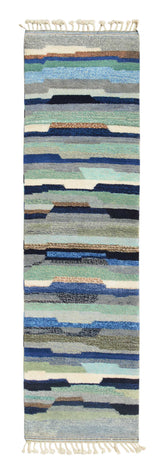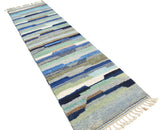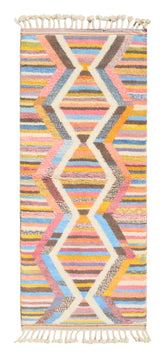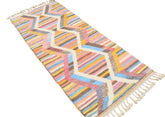A Story of Authenticity, Soul, and Expression
How did you get into the rug industry?
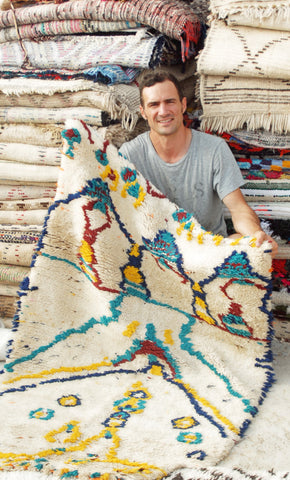
What is something you love about working with rugs?
"I love the colors, textures, designs, and the handmade elements of the craft. Rugs are a labor of love that can be fully experienced by all the senses. Rugs are also a practical art form that last a long time, and I love the idea of creating things that could last 100 years."
What are some of the biggest lessons you have learned about the industry since relocating to Morocco?
"I have realized and learned to appreciate truly how valuable the experience and creativity of Moroccan weavers are. Simply put, their level of craftsmanship is unparalleled in the whole industry, and there is no replacement for their work. The amount of time and effort that goes into making a single rug is astounding. When I entered the Morocco industry and saw how poorly compensated and supported the weavers were, it shocked me. These are the artists bearing the weight of a deep and rich tradition and yet are barely making enough to get by. Seeing this discrepancy between the value of the trade and the artisans' compensation, it has been one of my strategic goals as a brand to invest in the continuation of the weaving tradition by supporting these ladies. It has also opened my eyes to how much money middle-men are taking from the industry. Seeing how money flows through the world of rugs has motivated me to establish transparency throughout my entire weaving process. We work hard to cut out every middle process to provide true Moroccan masterpieces without supporting big corporations who seek unfair gain from the labor of others. We control our whole supply chain, from sourcing the wool in the Atlas Mountains to shipping our rugs worldwide. It brings me peace of mind to support and continue the purity and vibrancy of the Moroccan rug tradition."
What is different about Moroccan rugs compared to other countries?
"Moroccan rugs, in some ways, could be considered the worst rugs in the world. They create a raw art form. The seemingly random mix of colors, asymmetrical designs, and often crooked finishes create an unrefined bohemian style that is always unique. And that is honestly one of the things I love the most about the industry. It is an unrefined art. There is much more soul and spirit, almost jazzy. This is very different from a lot of countries and traditions that consistently produce rugs with the same colors, patterns, and designs repeatedly for centuries. I love being able to embrace the free, soulful heart of Morocco and develop a method to be able to consistently produce pieces to match that vibe."
How has your style been influenced by the weaving traditions of Morocco?
"Almost all of our designs have been influenced by Moroccan traditions. I also take a lot of inspiration from other African textiles, like mud cloths. My biggest deviation from older Moroccan tradition is in color. I love working with colors and pushing the boundaries on different combinations. So, in some of my rugs, you will find colors that aren’t present in more traditional Moroccan designs. A lot of older Moroccan rugs rely heavily on reds and oranges. I like to mix it up a bit. I like the purples, and the aquas, and the fuchsias, and the indigos, so you will see a lot more colors in my weaving than in a lot of the traditional Moroccan pieces."
What are some lessons you have learned from operating a cross-cultural business?

"Crossing cultures can be painful. I mean, there are many times it’s just hard. Really trying to understand my employees, trying to understand their needs and how to help them, how to work together as a team, and how to build trust has been a gradual education. That is a long process that takes more adjusting than just learning language. A lot of ways business is done here is just different. It takes humility and a willingness to have your ways of doing things be changed by the people around you."
What is the most rewarding part of what you do?
"I just love working with the weavers and getting to know their families. Working together as a team is so rewarding. I also love being able to partner with interior designers and artists around the world to create the most unique pieces. We take a design, maybe working with some artist in Paris or LA, and our team is able to take that design, craft it into a rug, and then bless someone with that masterpiece. Being able to see our finished product on the floor of a satisfied client is such a rewarding feeling."
What is different about your approach or philosophy that sets you apart?
"I don’t really work to make uber amounts of money. Our business is primarily a labor of love, a lifestyle business. No one is getting rich from our model. But I love being able to continue working and learning about the arts, the textiles, the weavers, and the tradition. Our lifestyle is wrapped up in this business. We do it because we love it, and I believe our products reflect that. It is a fun journey."
What is one lesson that you think the world would benefit from learning from the Moroccan weaving tradition?

"Freedom of expression. The thing that made the world fall in love with Moroccan rugs is just the fact that they are so unique and funky, and each one’s different. In the world we live in now, we need to learn to appreciate each other and our uniqueness, and not try to be so cookie cutter; we need to let ourselves be able to be artistic and just create. I still continue to do that with my weavers, giving them freedom of expression throughout the process of creating these rugs. It is a lesson that we all should take and apply to our daily lives."
Be sure to follow Illuminate Collective on Instagram and Facebook to stay up to date with all of the exciting stories and experiences from Morocco!

